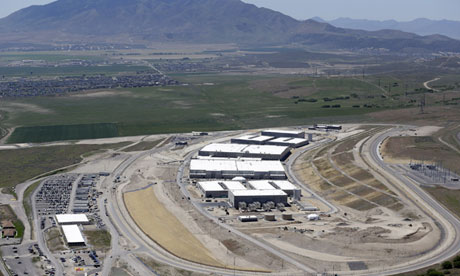 |
| By September 2013, the NSA's new data centre will employ around 200 technicians, occupying 1m sq ft and use 65 megawatts of power. |
guardian | Let's be absolutely clear about the news that the NSA collects massive amounts of information on US citizens – from emails, to telephone calls, to videos, under the Prism program and other Fisa court orders: this story has nothing to do with Edward Snowden.
As interesting as his flight to Hong Kong might be, the pole-dancing
girlfriend, and interviews from undisclosed locations, his fate is just a
sideshow to the essential issues of national security versus
constitutional guarantees of privacy, which his disclosures have surfaced in sharp relief.
Snowden
will be hunted relentlessly and, when finally found, with glee, brought
back to the US in handcuffs and severely punished. (If Private Bradley Manning's
obscene conditions while incarcerated are any indication, it won't be
pleasant for Snowden either, even while awaiting trial.) Snowden has
already been the object of scorn and derision from the Washington
establishment and mainstream media, but, once again, the focus is
misplaced on the transiently shiny object. The relevant issue should be:
what exactly is the US government doing in the people's name to "keep us safe" from terrorists?
Prism and other NSA
data-mining programs might indeed be very effective in hunting and
capturing actual terrorists, but we don't have enough information as a
society to make that decision. Despite laudable efforts led by Senators
Ron Wyden and Mark Udall to bring this to the public's attention that
were continually thwarted by the administration because everything about
this program was deemed "too secret", Congress could not even exercise
its oversight responsibilities. The intelligence community and their
friends on the Hill do not have a right to interpret our rights absent
such a discussion.
The shock and surprise that Snowden exposed
these secrets is hard to understand when over 1.4 million Americans hold
"top secret" security clearances. When that many have access to
sensitive information, is it really so difficult to envision a leak?
We
are now dealing with a vast intelligence-industrial complex that is
largely unaccountable to its citizens. This alarming, unchecked growth
of the intelligence sector and the increasingly heavy reliance on
subcontractors to carry out core intelligence tasks – now estimated to
account for approximately 60% of the intelligence budget – have
intensified since the 9/11 attacks and what was, arguably, our
regrettable over-reaction to them.
The roots of this trend go back
at least as far as the Reagan era, when the political right became
obsessed with limiting government and denigrating those who worked for
the public sector. It began a wave of privatization – because everything
was held to be more "cost-efficient" when done by the private sector –
and that only deepened with the political polarization following the
election of 2000. As it turns out, the promises of cheaper, more
efficient services were hollow, but inertia carried the day.
Today, the intelligence sector is so immense that no one person can manage, or even comprehend, its reach


1 comments:
The Wall Street Journal was purchased by New Corp in 2007. I started reading it many years before.
Post a Comment